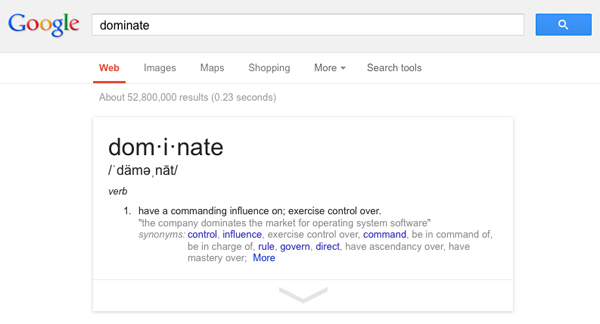
Dominating your niche on Google can be a very profitable SEO strategy. Ranking well for keywords related to a specific niche helps drive higher quality traffic to your site and differentiates your brand.
Follow these five steps to dominate your niche on Google.
Step 1: Determine Your Niche
If you haven’t already, the first step to dominating your niche on Google is determining what it is. The more specific your niche is, the better.
Your business may offer many different products or services, but what is the one product or service your business is known for, or you would like to be known for? That is the niche you should choose to dominate on Google.
Depending on your competition and resources, it can be very difficult and sometimes impossible to dominate for multiple niches on Google. So, it usually makes sense to focus on one niche.
Let’s take for example, a law firm that specializes in personal injury law, but also does criminal and family law. Ideally, this law firm would love to dominate Google for all three practice areas. However, unless they’re willing to invest the necessary resources into developing three separate websites and managing three separate SEO campaigns, this would be very difficult to achieve. Because the firm in this example has limited resources, they would have a much greater chance for success by focusing optimization efforts on personal injury law, since that is their specialty.
Why? Google wants to provide users with information that is highly relevant to their needs.
When someone is searching for a personal injury lawyer, that is exactly what they want to find. A user will not respond favorably if their search for personal injury lawyers provides results for criminal and family lawyers who also practice personal injury law, because those results are not as relevant to the user’s immediate needs.
Step 2: Optimize with Niche Specific Keywords
Once you’ve decided on a niche to dominate, you must choose the right keywords.
Determining the right keywords to optimize for is crucial. It requires understanding your target audience, and the keywords they use when searching for your product or service. It also requires being specific. You can’t dominate a niche by going after generic keywords.
Optimizing for keywords specific to your niche has multiple benefits. These keywords will be less competitive, and therefore easier to rank well, and these keywords will deliver traffic to your site that is more likely to convert.
Going back to the previous example, the person who searches the keyword phrase, “lawyer + location” is far less likely to convert than the person who searches the keyword phrase, “personal injury lawyer motorcycle accident + location.” The latter search query is indicative of someone who knows exactly what they’re looking for. When that person finds a personal injury lawyer who specializes in motorcycle accident cases in their area, that lawyer will have a great chance of converting them into a new client.
Step 3: Implement Google Authorship
Implementing Google Authorship will enable your face and name to appear next to your website in the search results. This not only allows users to associate a face with your organization, but also promotes your personal brand by allowing you to appear as an authority within your niche. This is especially powerful for medical professionals, legal professionals, and consultants, where your personal brand is strongly tied to your organization’s brand.
In addition to helping establish trust and credibility with your target audience, Google Authorship may influence rankings now and in the future, but this is highly debated. What we do know is that Google Authorship can have a positive impact on click-through rates (CTR), because Authorship increases a site’s visibility in the search results. Just make sure to use a professional photo that will be well received by your target audience.
Step 4: Write Great, Authoritative Content Often
The next step is to write great, authoritative content often, on topics that are relevant to your niche. Writing great, authoritative content serves three purposes. It:
- Shows that you’re an expert and a thought leader in your niche.
- Acts as a resource for potential customers, and gives them a reason to come back to your site.
- Provides Google with more quality content to index, which can have a positive impact on rankings.
However, when writing this content, be sure to write it for your target audience, and not for Google. You can still incorporate keywords into the content, but just make sure it sounds natural, and reads well.
Step 5: Use Google+ to Promote Your Content
Google+ profiles and posts are included in Google’s index, which provides potential customers with an additional avenue to find your content. You’re already halfway there because you had to create a Google+ profile in order to implement Google Authorship in step 3. However, simply setting up a profile is not enough. You must post relevant content regularly (which you’re already doing in step 4), as well as build an audience and engage them.
While we know that +1’s don’t directly impact rankings, we do know that Google+ does influence search results for signed in Google+ users. So, by building your Google+ network, and engaging your audience with relevant content that encourages +1’s, you can actually influence their search results.
In addition to a Google+ profile, you can also create a Google+ Business Page, which allows you to share content and engage with your target audience as your brand, rather than as yourself. Whether creating a Google+ Profile or Business Page, or both makes sense for you depends on your business, and whether you have the resources available to successfully manage both.
Conclusion
It requires a lot of time and effort to execute these five steps successfully, but if you do, you will be well on the way to dominating your niche on Google.
